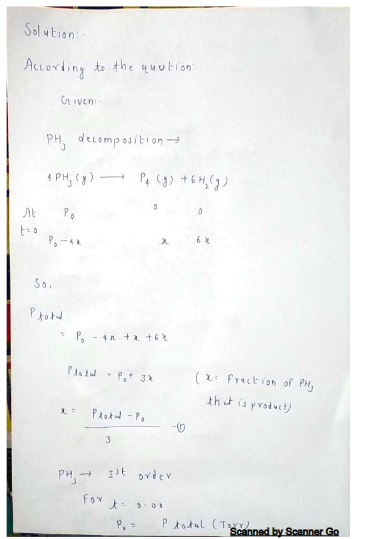Phosphine, PH3(g)PH3(g), decomposes according to the equation 4PH3(g)⟶P4(g)+6H2(g)4PH3(g)⟶P4(g)+6H2(g) The kinetics of the decomposition of phosphine at 950950 K was followed by measuring the total pressure in the system as a function of time. The data in the table were obtained in a run where the reaction chamber contained only pure phosphine at the start of the reaction. Time (min) Ptotal (Torr) 0.00 100 40.0 151 80.0 168 100 171 Choose the rate law that describes this reaction. rate=?(?PH3)−1rate=k(PPH3)−1 rate=?(?PH3)2rate=k(PPH3)2 rate=?rate=k rate=?(?PH3)−2rate=k(PPH3)−2 rate=?(?PH3)rate=k(PPH3) Calculate the value of the rate constant and determine the correct units.
Phosphine, PH3(g)PH3(g), decomposes according to the equation 4PH3(g)⟶P4(g)+6H2(g)4PH3(g)⟶P4(g)+6H2(g) The kinetics of the decomposition of phosphine at 950950 K was followed by measuring the total pressure in the system as a function of time. The data in the table were obtained in a run where the reaction chamber contained only pure phosphine at the start of the reaction. Time (min) Ptotal (Torr) 0.00 100 40.0 151 80.0 168 100 171 Choose the rate law that describes this reaction. rate=?(?PH3)−1rate=k(PPH3)−1 rate=?(?PH3)2rate=k(PPH3)2 rate=?rate=k rate=?(?PH3)−2rate=k(PPH3)−2 rate=?(?PH3)rate=k(PPH3) Calculate the value of the rate constant and determine the correct units.
Chemistry
10th Edition
ISBN:9781305957404
Author:Steven S. Zumdahl, Susan A. Zumdahl, Donald J. DeCoste
Publisher:Steven S. Zumdahl, Susan A. Zumdahl, Donald J. DeCoste
Chapter1: Chemical Foundations
Section: Chapter Questions
Problem 1RQ: Define and explain the differences between the following terms. a. law and theory b. theory and...
Related questions
Question
Phosphine, PH3(g)PH3(g), decomposes according to the equation
4PH3(g)⟶P4(g)+6H2(g)4PH3(g)⟶P4(g)+6H2(g)
The kinetics of the decomposition of phosphine at 950950 K was followed by measuring the total pressure in the system as a function of time. The data in the table were obtained in a run where the reaction chamber contained only pure phosphine at the start of the reaction.
| Time (min) | Ptotal (Torr) |
|---|---|
| 0.00 | 100 |
| 40.0 | 151 |
| 80.0 | 168 |
| 100 | 171 |
Choose the rate law that describes this reaction.
rate=?(?PH3)−1rate=k(PPH3)−1
rate=?(?PH3)2rate=k(PPH3)2
rate=?rate=k
rate=?(?PH3)−2rate=k(PPH3)−2
rate=?(?PH3)rate=k(PPH3)
Calculate the value of the rate constant and determine the correct units.
Expert Solution
Step 1
Solution -

Trending now
This is a popular solution!
Step by step
Solved in 4 steps with 4 images

Knowledge Booster
Learn more about
Need a deep-dive on the concept behind this application? Look no further. Learn more about this topic, chemistry and related others by exploring similar questions and additional content below.Recommended textbooks for you

Chemistry
Chemistry
ISBN:
9781305957404
Author:
Steven S. Zumdahl, Susan A. Zumdahl, Donald J. DeCoste
Publisher:
Cengage Learning

Chemistry
Chemistry
ISBN:
9781259911156
Author:
Raymond Chang Dr., Jason Overby Professor
Publisher:
McGraw-Hill Education

Principles of Instrumental Analysis
Chemistry
ISBN:
9781305577213
Author:
Douglas A. Skoog, F. James Holler, Stanley R. Crouch
Publisher:
Cengage Learning

Chemistry
Chemistry
ISBN:
9781305957404
Author:
Steven S. Zumdahl, Susan A. Zumdahl, Donald J. DeCoste
Publisher:
Cengage Learning

Chemistry
Chemistry
ISBN:
9781259911156
Author:
Raymond Chang Dr., Jason Overby Professor
Publisher:
McGraw-Hill Education

Principles of Instrumental Analysis
Chemistry
ISBN:
9781305577213
Author:
Douglas A. Skoog, F. James Holler, Stanley R. Crouch
Publisher:
Cengage Learning

Organic Chemistry
Chemistry
ISBN:
9780078021558
Author:
Janice Gorzynski Smith Dr.
Publisher:
McGraw-Hill Education

Chemistry: Principles and Reactions
Chemistry
ISBN:
9781305079373
Author:
William L. Masterton, Cecile N. Hurley
Publisher:
Cengage Learning

Elementary Principles of Chemical Processes, Bind…
Chemistry
ISBN:
9781118431221
Author:
Richard M. Felder, Ronald W. Rousseau, Lisa G. Bullard
Publisher:
WILEY